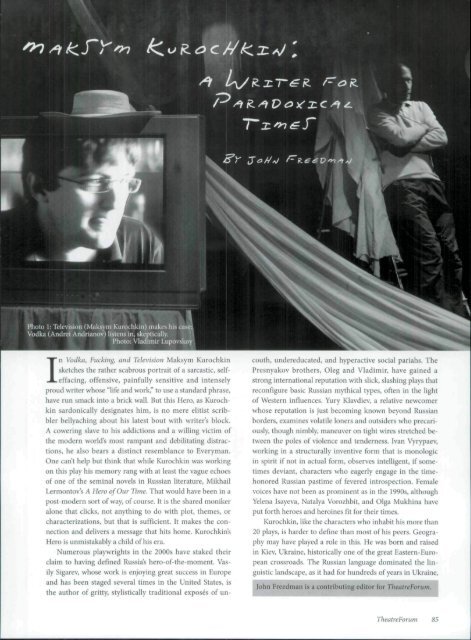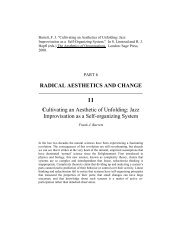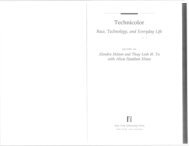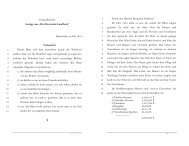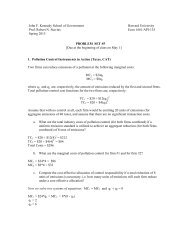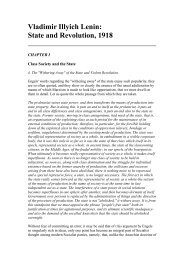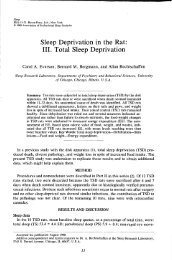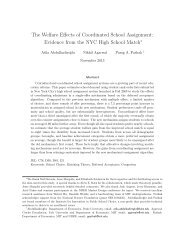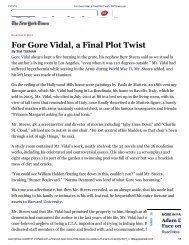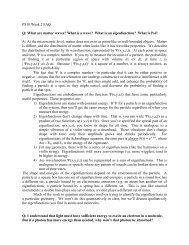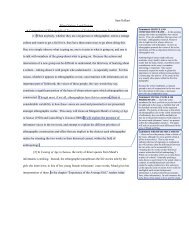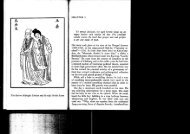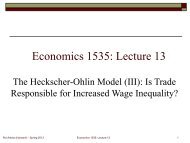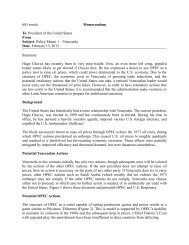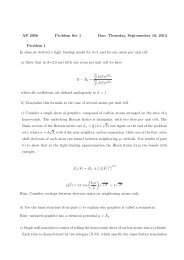In Vodka, Fucking, and Television Maksym Kurocbkin sketches - iSites
In Vodka, Fucking, and Television Maksym Kurocbkin sketches - iSites
In Vodka, Fucking, and Television Maksym Kurocbkin sketches - iSites
Create successful ePaper yourself
Turn your PDF publications into a flip-book with our unique Google optimized e-Paper software.
<strong>In</strong> <strong>Vodka</strong>, <strong>Fucking</strong>, <strong>and</strong> <strong>Television</strong> <strong>Maksym</strong> <strong>Kurocbkin</strong><br />
<strong>sketches</strong> the rather scabrous portrait of a sarcastic, selfeffacing,<br />
offensive, painfully sensitive <strong>and</strong> intensely<br />
proud writer whose "tife <strong>and</strong> work," to use a st<strong>and</strong>ard phrase,<br />
have run smack into a brick wait. But this Hero, as Kurochkin<br />
sardonicatly designates him, is no mere elitist scribbler<br />
betlyaching about his latest bout with writer's block.<br />
A cowering stave to his addictions <strong>and</strong> a willing victim of<br />
the modern world's most rampant <strong>and</strong> debilitating distractions,<br />
he also bears a distinct resemblance to Everyman.<br />
One can't help but think that while Kurochkin was working<br />
on this play his memory rang with at least the vague echoes<br />
of one of the seminal novels in Russian literature. Mikhail<br />
Lermontov's A Hero of Our Time. That would have been in a<br />
post-modern sort of way, of course. It is the shared moniker<br />
alone that clicks, not anything to do with plot, themes, or<br />
characterizations, but that is sufficient. It makes the connection<br />
<strong>and</strong> delivers a message that hits home. Kurochkin's<br />
Hero is unmistakably a child of his era.<br />
Numerous playwrights in the 2000s have staked their<br />
claim to having defmed Russia's hero-of-the-moment. Vasily<br />
Sigarev, whose work is enjoying great success in Europe<br />
<strong>and</strong> has been staged several times in the United States, is<br />
the author of gritty, stylistically traditional exposes of un-<br />
couth, undereducated, <strong>and</strong> hyperactive social pariahs. 'I'he<br />
Presnyakov brothers, Oleg <strong>and</strong> Vladimir, have gained a<br />
strong international reputation with slick, stashing plays that<br />
reconfigure basic Russian mythicat types, often in the tight<br />
of Western inftuences. Yury Klavdiev, a relative newcomer<br />
whose reputation is just becoming known beyond Russian<br />
borders, examines votatite loners <strong>and</strong> outsiders who precariously,<br />
though nimbty, maneuver on tight wires stretched between<br />
the poles of violence <strong>and</strong> tenderness. Ivan Vyrypaev,<br />
working in a structurally inventive form that is monologic<br />
in spirit if not in actual form, observes intelligent, if sometimes<br />
deviant, characters who eagerly engage in the timehonored<br />
Russian pastime of fevered introspection. Female<br />
voices have not been as prominent as in the 1990s, although<br />
Yelena Isayeva, Natalya Vorozhbit, <strong>and</strong> Otga Mukhina have<br />
put forth heroes <strong>and</strong> heroines fit for their times.<br />
Kurochkin, tike the characters who inhabit his more than<br />
20 ptays, is harder to define than most of his peers. Geography<br />
may have played a role in this. He was born <strong>and</strong> raised<br />
in Kiev, Ukraine, historicatly one of the great Eastern-European<br />
crossroads. The Russian tanguage dominated the linguistic<br />
l<strong>and</strong>scape, as it had for hundreds of years in Ukraine,<br />
John Ereedman is a contributing editor for TheatrePorum.<br />
TheatreForum 85
helping to ensure <strong>Kurocbkin</strong> would write in Russian. But<br />
aside from tbe obviously prominent native Ukrainian speecb,<br />
<strong>Kurocbkin</strong> also occasionally heard, or at least saw, evidence of<br />
the familiar but opaque cbatter of Polish <strong>and</strong> Belarusian. For<br />
tbe record, <strong>Kurocbkin</strong> flatly denies possessing any exceptional<br />
linguistic powers. "My mixing of languages [in some plays]<br />
reveals a complex I have," he wrote to me in an email with<br />
typically merciless self-deprecation. "This is a real sore spot.<br />
The fact of tbe matter is I do not bave a good ear. I am very<br />
bad at capturing linguistic peculiarities" (27 October 2007).<br />
As he sees it, he was h<strong>and</strong>icapped<br />
in comparison to<br />
his parents <strong>and</strong> friends<br />
who knew Polish well. As<br />
for Beiarusian, he notes<br />
ironically that bis first significant<br />
contact with that<br />
language occurred during<br />
perestroika when, in the<br />
Beiarusian satirical journal<br />
Vozhik (Hedgehog),<br />
be encountered the only<br />
caricature he had ever seen<br />
of Joseph Stalin (24 October<br />
2007). Be tbat as it<br />
may, a broad cultural diversity<br />
simmered beneatb<br />
the surface of life in Kiev<br />
even as the Russian tongue<br />
claimed supremacy over ail<br />
things cultural.<br />
Emissaries of Western<br />
societies also pressed in<br />
upon Kurochkin's sensibilities,<br />
primarily by way<br />
of cinema <strong>and</strong> television.<br />
Born in 1970, he was a<br />
member of the last generation<br />
to mature in the crumbling<br />
Soviet empire. This<br />
was a time when technology<br />
unleashed an unprecedented<br />
<strong>and</strong> unrelenting<br />
deluge of information,<br />
knowledge, propag<strong>and</strong>a,<br />
<strong>and</strong> downright gibberish on a society tbat previously had been<br />
relatively controlled <strong>and</strong> comparatively closed. This sent an<br />
entire region's cultural barometer into paroxysms. For matiy<br />
in the l<strong>and</strong>s east of Europe, the usual fiow of time was interrupted,<br />
although each person had his or her own reason for<br />
thinking so. Some saw these events as the end of the world,<br />
the loss of an entire social structure by whicb they deftned<br />
their very being. Others interpreted these developments as tbe<br />
fruition of their dreams, the culmination of historical inevitability<br />
<strong>and</strong> an opportunity to begin creating civilization anew.<br />
86 TheatreForum<br />
Tbe result is that the greater Slavic world experienced a nearly<br />
catastropbic warp in time, the past seeming to vanisb altogether<br />
wbile the future rusbed in to overwbelm the present.<br />
To borrow a phrase he coined in 2004, in an article composed<br />
while in residence at Iowa University's <strong>In</strong>ternationa! Writing<br />
Program, Kurochkin is botb a product <strong>and</strong> an explorer of<br />
"society's informational obesity" ("The Second Speed"). When<br />
<strong>Kurocbkin</strong> entered Kiev University in the early 1990s, he<br />
actually symbolized the paradoxes of his age by his choice of<br />
study. Applying the advaticed principles of astroarchaeology,<br />
he conducted research in<br />
the field of pre-Christian<br />
Slavic monuments.<br />
Kurochkin, it seems<br />
me, is an ideal writer<br />
for the global age.<br />
Amidst confiicting voices<br />
he hears a common message.<br />
Across vast breaches<br />
of time he espies<br />
timeless customs <strong>and</strong><br />
rituals. Among differing<br />
cultural traditions he discertis<br />
shared values. <strong>In</strong> a<br />
play like Kitchen (2000),<br />
I find sitnilarities with<br />
Tony Kusbner's Angels in<br />
America—noi because of<br />
tbe topic but because of<br />
the works' scope <strong>and</strong> the<br />
authors' desire to map<br />
out cardiograms for tbeir<br />
respective nations. Tbe<br />
masterful, sweeping, <strong>and</strong><br />
utterly untranslatable<br />
Kitchen conjoined characters<br />
from the ancient<br />
Nibelung myth witb<br />
modern Russians, wbile<br />
wrestling with one of ibe<br />
most painful subjects<br />
ot our time-—to avenge<br />
or not to avenge the<br />
sins of tbe past. Being a<br />
poet, <strong>Kurocbkin</strong> left the<br />
answers to tbe spectators, inspiring tbem as tnucb as baffling<br />
tbe critics. Kitchen is typical of Kurochkin's drama in<br />
its obliteration of conventional unities. His Stalowa Wola<br />
(1998), or Steel Will, mixed the Polisb Middle Ages with the<br />
Space Age <strong>and</strong> used both Russian <strong>and</strong> Polish languages. His<br />
Fighter Class "Medea" (1994)—like <strong>Vodka</strong>, <strong>Fucking</strong>, <strong>and</strong> <strong>Television</strong>,<br />
translated into Englisb by John Hanlon—observed<br />
an outl<strong>and</strong>isb, futuristic war of the sexes being fougbt on<br />
the edge of the last city st<strong>and</strong>ing, by Ukrainian, Russian, <strong>and</strong><br />
American soldiers speaking a stew of languages.
These plays, however, reflect only one aspect of Kurochkin's<br />
tatent. I know of no other Russian-tanguage ptaywright<br />
who strives so to reinvent his art with each new play he<br />
writes. Eottowing the enormous success of Kitchen, Kurochkin<br />
delivered the ambitious Imago (2002), a radical reinterpretation<br />
of George Bernard Shaw's Pygmalion. This piece<br />
mounted a peculiar defense of everything unsophisticated<br />
in the eternal battle between the unwashed <strong>and</strong> the respectable.<br />
Simultaneousty, he unveited <strong>In</strong> the Retina (2002), the<br />
intimate dramatization of a strange story by the Ukrainianborn,<br />
Russian writer Sigizmund Krzhizhanovsky about a<br />
man disappearing into his tover's eye to encounter everyone<br />
she has loved before him. Vastly different in style <strong>and</strong><br />
scope not only from Kitchen but from each other, these ptays<br />
shared only Kurochtcin's seemingly endtess flair for the eccentric<br />
<strong>and</strong> the paradoxical. None prepared us entirely for<br />
Repress <strong>and</strong> Excite (2006), an acerbic take on culture <strong>and</strong><br />
human retations in the twenty-first century whose form is<br />
a kind of parody of a boutevard metodrama. Repress <strong>and</strong><br />
Excite is being prepared for future publication in Theatre-<br />
Forum.<br />
<strong>Vodka</strong>, <strong>Fucking</strong>, <strong>and</strong> <strong>Television</strong> (written 2003, staged<br />
2006) is a smatl ptay with big pretensions. It is a Janus-faced<br />
piece that can be read as a personal confession or a portrait<br />
of a generation. When the Hero proclaims he must prove<br />
to himself he "can speak the truth," this is a clear-cut <strong>and</strong><br />
identifiable challenge for an individual, a society, <strong>and</strong>, perhaps,<br />
a whole planet overrun—in Kurochkin's memorable<br />
phrase—by "plush disposable heiresses." This play is a kind<br />
of suicide note, a declaration that life cannot go on as it has<br />
been. [Photo 2] Accordingly, the Hero calls in his friends.<br />
<strong>Vodka</strong>, <strong>Fucking</strong>, <strong>and</strong> <strong>Television</strong>, <strong>and</strong> gives them the news:<br />
one of them will have to go.<br />
The lies are everywhere <strong>and</strong> no one denies it.<br />
"<strong>Television</strong> is a magical window onto the natural world,<br />
a source of knowledge, a reliable friend in times of sadness<br />
<strong>and</strong> depression," gushes <strong>Television</strong> with no shame whatsoever.<br />
[Photo 1]<br />
"What a crock of shit," responds the Hero, probably muttering<br />
with loathing.<br />
Like most of his contemporaries, the Hero is contemptuous<br />
of those who came of age in the 1960s. "The Sixties<br />
generation," as that demographical group is known in Russia,<br />
is famed for its idealism <strong>and</strong> its failure to stop the nation<br />
from sliding into the devastating stagnation of the Brezhnev<br />
era. Kurochkin's irony here is as sharp as ever; not only does<br />
the Hero admit that he worships the great Sixties generation<br />
writers Alex<strong>and</strong>er Volodin <strong>and</strong> Alex<strong>and</strong>er Vampilov, but<br />
one has to wonder just how well the Hero's own generation<br />
is coping with the Putin era. Few will ever accuse it of being<br />
idealistic.<br />
"We are nobodies, we're nothing—we work in advertising<br />
<strong>and</strong> magazines," the Hero declares before wending his<br />
way around to one of those marvelously paradoxical observations<br />
that Kurochkin's characters are so apt to make or<br />
embody. "We're already nothing, we never existed," the Hero<br />
asserts. "But we will."<br />
If such a claim poses more questions than it answers,<br />
that, too, sounds very much like Kurochkin.<br />
SOURCES<br />
Kurochkin, <strong>Maksym</strong>. Emails to the author. 24 <strong>and</strong> 27 October<br />
2007.<br />
Kurochkin, Maxim [sic]. "The Second Speed." University<br />
of Iowa, n.d. www.uiowa.edu/~iwp/EVEN/docu-<br />
S~T 1^ G^<br />
^ ^ 3 R w/fl<br />
. . . . . . . .<br />
^e RG't t<br />
" • ^ "<br />
G^ R<br />
. . . .<br />
TheatreForum 87<br />
•


